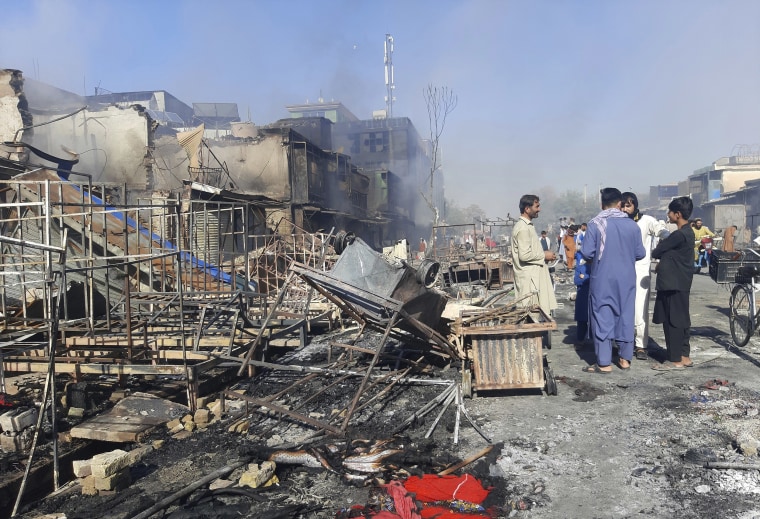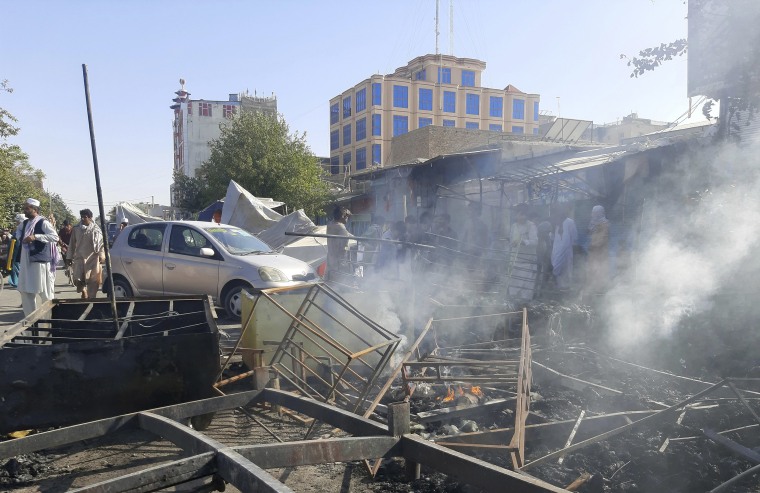KABUL, Afghanistan — The Taliban on Monday had seized control of at least five provincial capitals out of 34 in Afghanistan, as the militants pressed on in their offensive while American forces finalized their pullout from the war-torn country.
The rapid fall of provincial capitals deals a heavy blow to the crumbling Afghan government forces who have struggled to contain the Taliban’s offensive as U.S. and NATO troops withdraw from the country. The group has swept through the country at a speed that has even surprised some of the fighters themselves, terrifying millions of Afghans afraid of the militants' harsh and austere version of Islam.
The Taliban captured Sar-e Pul, in Sar-e Pul province in northern Afghanistan, and Taleqan, in the northeastern province of Takhar on Sunday.

Abdullah Bek, a lawmaker from Takhar Province, said Afghan security forces and militias had defended Taleqan city for 60 days before they had to give up and retreat. The city is now in the hands of the Taliban.
Hassan Sharifi, a lawmaker from Sar-e Pul province, told NBC News that Sar-e Pul city had fallen and that only one district remained in the government's hands in the province.
The gains add two more provincial capitals to the Taliban’s rapidly growing list as U.S. forces complete their withdrawal. The group captured its first provincial capital Friday in Nimroz Province.
On Saturday, the insurgent fighters claimed control of Sheberghan, the capital of the northern Jawzjan province. Azizullah Ulfaty, a lawmaker from Jawzjan province, told NBC News Monday that the city had fallen and that people are fleeing their homes as they fear they will be hurt in a potential counterattack from the government. Ulfaty said the airport and a nearby strategic hill where there is a military base remained in the hands of government forces and a local militia.
On Sunday Taliban fighters captured the city of Kunduz, a major Afghan commercial hub.
It remains unclear how long the group would be able to maintain control of its urban gains. Mirwais Stanekzai, a spokesperson for Afghanistan's Interior Ministry said Monday that Afghan forces were still fighting to defend Kunduz, Sheberghan and Sar-e-Pul cities. He said Afghan security forces had made "good achievements" in Kunduz city.
Download the NBC News app for breaking news and politics
The Taliban recently started laying siege to provincial capitals after taking rural administrative districts. Recently, the Taliban said it had captured more than half of Afghanistan's territory, including strategic border crossings.
A running analysis by Long War Journal, which was updated Sunday, showed 229 districts under Taliban control, with 66 under government control and 112 contested.
The capitals it claims to have captured since Friday stretch from the northeast of the country, round anti-clockwise to the southwest next to the border with Iran.
Speaking to Al-Jazeera TV on Sunday, Taliban spokesman Muhammad Naeem Wardak said there was no ceasefire agreement, and warned the United States against further intervention to support the government forces.
The insurgents' offensive has driven thousands of people from their homes to seek refuge, from both the fighting and the prospect of the Islamist regime that ruled the country before 2001 being re-imposed. While in power the Taliban enforced a hardline version of Islam, and women’s lives in particular were strictly controlled.
The United Nations’ children’s agency said Monday that at least 27 children have been killed and 136 injured in the past 72 hours alone. It said it was also deeply concerned about reports that children are increasingly being recruited into the conflict by armed groups.
As the Taliban turn their sights toward Afghan cities there have also been reports of assassination attempts of government officials in the capital, Kabul. On Saturday, the U.S. and British embassies in Kabul repeated a warning to citizens still there to leave “immediately” as the security situation deteriorated.

Afghan interpreters who worked with the U.S. military are also scrambling to leave the country through a Special Immigrant Visa program, designed to help former interpreters who now face retribution from the Taliban.
As of Friday, the Biden administration has overseen flights of Afghan evacuees and their families to the United States, for a total of about 700 people. More than 80,000 Afghans have sought U.S. visas under the Special Immigrant Visa program.
Abdul Rashid Shirzad, who spent nearly five years working for U.S. Navy SEALs, said he was desperate to be accepted as he feared for his life and those of his children.
“The Taliban are about to kill us,” he said in an interview in Kabul. “They can kill us today, they can kill us tomorrow, but they will never forget us.”
A State Department spokesperson condemned the Taliban offensive Sunday but said Afghan forces far outnumber the militants and that the U.S. would continue to support government forces.
The U.S. toppled the Taliban government in 2001 after the group sheltered Osama bin Laden, the architect behind the 9/11 attacks that triggered the U.S. invasion of Afghanistan and America’s longest war.
Biden said last month that the U.S. military mission in the country will conclude Aug. 31, earlier than initially announced. The conflict has cost the lives of around 2,300 U.S. troops. From 2001 to 2018, some 58,000 Afghan military and police were killed in the violence, according to a study by Brown University.
Between 2009, when the United Nations began documenting the impact of the war on civilians, and 2019, about 28 civilians have been killed or injured every day — more than 100,000 casualties.
Saphora Smith reported from London. Ahmed Mengli, Kelly Cobiella and Bill O'Reilly reported from Kabul.